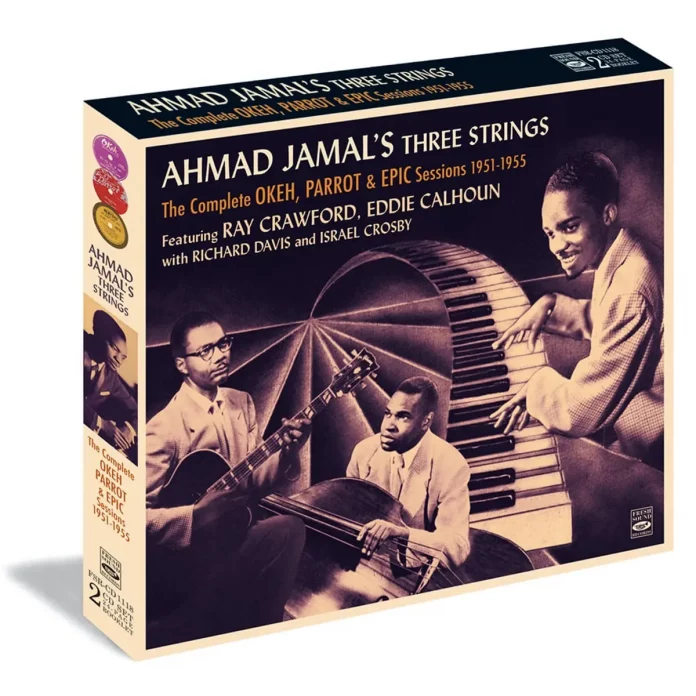Most of these early recordings by Ahmad Jamal and his “Three Strings” trios have been available on several CD compilations over the last few years. Perhaps the best known album is Ahmad Jamal: The Legendary Okeh & Epic Recordings, released on Epic in 2005. This updated release adds four sides (Ahmad Jamal Plays) made for Parrot in 1954.
Miles Davis and critic and producer John Hammond were among those who realised (and stated) that Pittsburgh-born Fritz Jones (soon to become Ahmad Jamal) was an exciting newcomer. Davis was so entranced by Jamal’s piano style that he had the scores transcribed by Red Garland for his quintet. Ramsey Lewis remembered: “Everybody in Chicago loved Ahmad. But nationally critics were slow to come around until Miles Davis came through town and made his remark about Ahmad being a major influence on him.”
Jamal’s drum-less trio, Ahmad Jamal’s Three Strings, was lauded for its freshness, dynamism and precision. A few dissenters ranked him as no more than a night-club cocktail pianist but writing in Downbeat in 1952, Hammond cited the Three Strings release of Surrey With The Fringe On Top, and called it “an altogether fascinating performance with drive, and unbelievable subtlety”.
Surveying Jamal’s Three Strings – and subsequent groups in the Wall Street Journal (2013), Marc Myers recalled that his distinctive style – “melodies played on the piano’s upper-most notes combined with elegant and brief mid-keyboard clusters” and his “conversational approach” impressed many pianists, including Phineas Newborn Jr., Oscar Peterson, Red Garland and Herbie Hancock.
This welcome two-volume set, assembled by Jordi Pujol of Fresh Sound Records, includes all of the early Okeh and Epic sessions already mentioned, but adds Excerpts From The Blues and the Okeh recordings of Perfidia and Rica Pulpa which were never issued on LP. He has also contributed a 23-page detailed essay (included in this box set) on the Three Strings, with many period photographs and a complete discography.
From 1950 to 1952, the group’s bassist was Eddie Calhoun, succeeded by Richard Davis from 1953 to 1954 and then by Israel Crosby in 1954.
Given the high standard of inventiveness of all of these 37 performances, it is difficult to choose the “best”. But from the Chicago sessions (1951-1955) try Ahmad’s Blues, Spring Is Here and a sprightly Gal in Calico. My choices from the 1955 New York sessions would be a lilting Perfidia with a splendid solo from guitarist Ray Crawford or a long (8.30) and tightly integrated Love For Sale, not to mention (but I do) a pulsating Pavanne. Whatever the choices, the young Jamal and his cohorts will delight and entertain.
Discography
CD1: (1) The Surrey With The Fringe On Top; Will You Still Be Mine?; Rica Pulpa; Perfidia; Aki And Ukthay (Brother And Sister); Billy Boy; Ahmad’s Blues; A Gal In Calico; But Not For Me; Excerpts From The Blues; It Could Happen To You; Seleritus; New Rhumba; A Foggy Day; All Of You; It Ain’t Necessarily So; I Don’t Wanna Be Kissed (By Anyone But You); I Get A Kick Out Of You; Jeff; Darn That Dream; Spring Is Here (70.01)
CD2: (2) Perfidia; Slaughter On Tenth Avenue; Old Devil Moon; Black Beauty; Don’t Blame Me; Rica Pulpa; Autumn Leaves; Crazy He Calls Me; They Can’t Take That Away From Me; It’s Easy To Remember; Just Squeeze Me; Something To Remember You By; Poinciana (The Song Of The Tree); The Donkey Serenade; Love For Sale; Pavanne (64.26)
(1) Collectively, Jamal (p); Ray Crawford (g); Eddie Calhoun (b, pc); Richard Davis, Israel Crosby (b). Chicago, 1951-1955.
(2) Jamal (p); Crawford (g); Crosby (b). New York City, 25 October 1955.
Fresh Sound Records FSR CD 1118
















